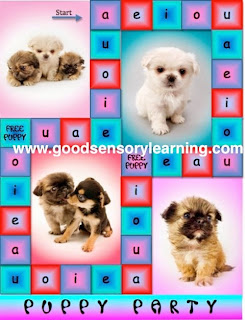This week I wanted to tell you about my online store, Good Sensory Learning. I’m Dr. Erica Warren, and I established this site so I could share all the materials that I have created over the last 20+ years as a learning specialist and educational therapist. When I first began my private practice, Learning to Learn, I had great difficulty finding fun and multisensory materials for my students that were effective and engaging. So back in 2005, I made it my mission to design and distribute high-end, remedial products as well as memorable, motivating lessons that bring delight to learning. If you would like to try a free sampling of my activities , CLICK HERE . How Are the Products Organized at Good Sensory Learning? You can download my Free Printable Catalog or you can browse the site using the grey “search all products” bar in the top right of any page with keywords such as dyslexia, working memory, and executive functioning. What’s more, drop down menus in the red banner allow you t...
With the holiday season almost upon us, finding fun and beneficial educational materials can be key for keeping students with dyslexia busy over the break. What's more, you can continue to use these activities throughout the year to help remediate areas of difficulty. Games can be one of the best ways to help these kids, especially because struggling learners won't even know that their brains are hard at work!

 Holiday Gift:One of my favorite games, Puppy Party, helps students to master the short vowels sounds and is great for any Orton-Gillingham or phonics-based reading program. Click here to get your free downloadable copy!
Holiday Gift:One of my favorite games, Puppy Party, helps students to master the short vowels sounds and is great for any Orton-Gillingham or phonics-based reading program. Click here to get your free downloadable copy!Ten Great Games to Buy for Kids with Dyslexia:
- Hey What's the Big Idea: This is a fun, family game that teaches children how to generate and discriminate between main ideas and details.
- Word Shuffle: Word Shuffle is a fabulous word game that strengthens processing speed and language skills. With three levels - elementary, middle school and high school, students will master concepts like rhyming words, grammar, parts of speech, figurative language and literary terms.
- 5 Ws Detective: This delightful sentence game develops language skills, sequencing, word retrieval and helps beginning writers solve silly cases by answering who did it, what they did when it was done, and why it happened. Players work against the clock to fill in the data and summarize their findings.
- Reading Games: Great for any Orton-Gillingham or Phonics based reading program, Reading Games offers 11 games, 17 printable decks and two printable board games that work on the different types of syllables, syllabication, affixes, and compound words.
- Reading Games 2: Like Reading Games, these games work seamlessly with any Orton-Gillingham or Phonics based reading program. These games focus on blending and spelling.
- Reading Board Games: Orton-Gillingham or Phonics friendly, Reading Board Games offers 7 reproducible board games that cover the 6 syllable types as well as syllabication.
- Piggy Banking: This engaging board game helps players learn how to use a debit card, bank register and to write checks. They will also learn about bank loans, bounced checks, discounts, tips, rebased, interest and more.
- Place Value Panic: With 4 games ranging in difficulty level, Place Value Panic is loads of fun. The simplest game works on the ones, tens, hundreds and thousands place, whereas the most difficult level uses 13 place values.
- Show Don't Tell: Show Don't Tell is a fun, multisensory writing game that helps players to "show readers" with descriptive verbs, adjectives, adverbs, similes, metaphors, and personification. Instead of telling stories, learners will quickly master descriptive writing.
- Grammar Games Galore: Grammar Games Galore offers 5 new and engaging card games that help players master the parts of speech.

I wish you and your family a wonderful, fun-filled holiday season.
Cheers, Erica
Dr. Erica Warren is the author, illustrator, and publisher of multisensory educational materials at Good Sensory Learning and Dyslexia Materials. She is also the director of Learning to Learn and Go Dyslexia, in Ossining, NY. To learn more about her products and services, you can go to https://godyslexia.com/, www.goodsensorylearning.com, www.dyslexiamaterials.com & www.learningtolearn.biz
· Blog: https://learningspecialistmaterials.blogspot.com/
· YouTube Channel: https://www.youtube.com/user/warrenerica1
· Podcast: https://godyslexia.com/
· Store: http://www.Goodsensorylearning.com/ & www.dyslexiamaterials.com
· Courses: http://www.learningspecialistcourses.com/
· Newsletter Sign-up: https://app.convertkit.com/landing_pages/69400

Comments
Post a Comment